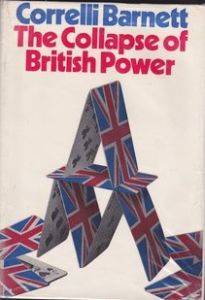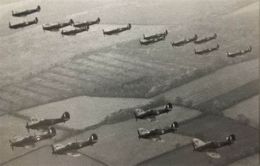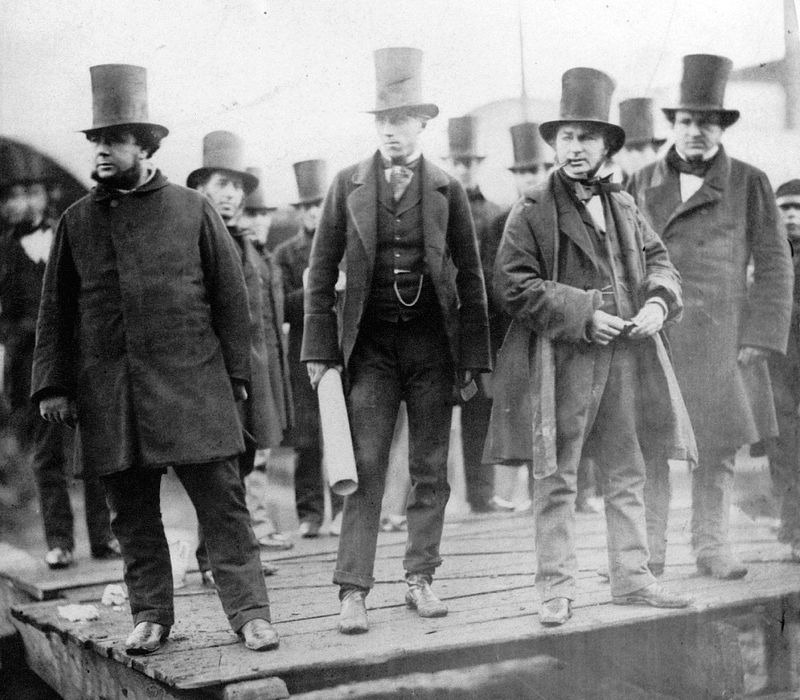Is the US Following the British Empire’s Road to Collapse?
Posted By Morris van de Camp On In North American New Right | Comments DisabledCorrelli Barnett
The Collapse of British Power
Frome & London: Butler & Tanner Ltd., 1972
Correlli Barnett is one of the rare British historians who views the Second World War as a disaster rather than in the usual flummery proclaiming that it was Britain’s “finest hour.” Barnett frames the scale of the calamity by illustrating Britain’s situation thusly:
The predicament which Churchill’s Government faced after the fall of France was unique in English history: a war without an ally against two great powers, probably three; an ill-defended, ill-organized, ill-defined, ill-developed and immensely vulnerable empire; an inadequate industrial machine and insufficient national wealth. Yet only sixty years earlier Britain had been the richest country in the world; she had been ‘the Workshop of the World’. Only twenty-two years earlier she had emerged victorious from the Great War powerful in herself, buttressed by great allies, and with her one great enemy lying smashed in defeat.
The plight of the summer of 1940 therefore marked the consummation of an astonishing decline in British fortunes. The British invested their feebleness and isolation with romantic glamour — they saw themselves as latter-day Spartans, under their own Leonidas, holding the pass for the civilized world. In fact it was a sorry and contemptible plight for a great power, and it derived neither from bad luck, nor from the failures of others. It had been brought down upon the British by themselves. (p. 15)
How exactly did the British get themselves into this situation? Barnett looks at the long decline between 1914 and 1945 from several angles. Perhaps the biggest problem was the education of the British political elite that was taking place at the end of the nineteenth century. The establishment that was in control of the British Empire during the two wars had been educated between 1860 and 1900.
A Race of Innocents Dedicated to Romantic Ideals
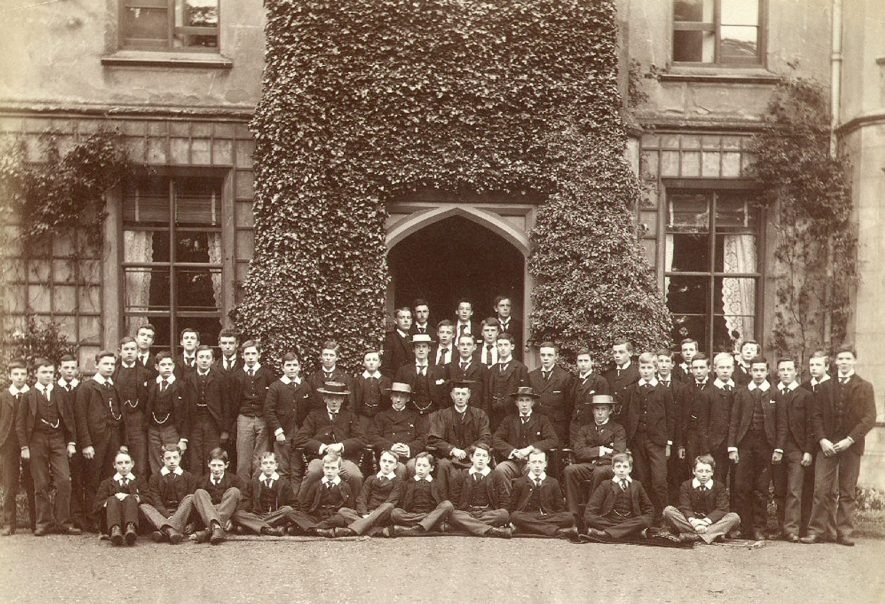 [3]
[3]The British political elite during both world wars had been educated in public schools such as Rugby, Harrow, and Eaton. This picture shows boys at Rugby in Warwickshire, England in the early 1900s.
Barnett argues that during the eighteenth century, the British were led by hard-thinking, unsentimental men with iron wills. They thought in terms of colonial real estate, advancing industry, concrete interests, and profits. By the end of the nineteenth century, the British elite began to value feeling above calculation or judgement. British sentimentalists abolished slavery, but abolition made the West Indies an economic and cultural backwater. Abolitionism ultimately led to two catastrophic wars elsewhere: one in the United States (1861-1865), the other in South Africa (1899-1902).
By the last decades of the nineteenth century, “Victorian preoccupation with morality, this romantic idealism, inspired the English public school until well into the twentieth century.” The British Empire began to understand its own rationale as putting down Arab slavers in eastern Africa or “protecting” heathens from German or French rule. There was no discussion about whether acquiring and administering these backwards places benefited Britain or not.
 [4]
[4]You can buy Greg Johnson’s The Year America Died here. [5]
Due to this romantic moralism, the British public were easy to move and easy to shock into moral frenzies by politicians such as William Gladstone. One of Gladstone’s moral crusades was supporting the Balkan nations against the Ottoman Turks. There was little thought given to this policy’s consequences of this policy. The Christian populations in the Balkans were united against the Turks but completely at odds with each other as well, and it ended up being the latter issue that was the greater problem. The collapse of Ottoman authority in the Balkans and the ferocious hatreds between the various Christian nations thus awakened became one of the First World War’s major causes.
Meanwhile, the public schools became increasingly detached from the changing world. In the 1880s the public schools gave little consideration for Germany’s meteoric rise to global power following their 1871 victory in the Franco-Prussian War. Their history texts stopped in 1815, with the end of the Napoleonic Wars. There were few, if any, lessons about the world economic situation as it existed in the present day.
The schoolteachers themselves were similarly detached. A headmaster [6] in a public school was himself a product of a public school who then attended a university run along the same lines, and after graduating he would then return to teach in a public school. Few were directly involved in industry, the military, or the hard edge of statecraft.
This fact is alluded to in the infantry platoon leader’s classic, The Defense of Duffer’s Drift [7] (1904) by Sir Ernest D. Swinton. Swinton’s imaginary junior officer, Lieutenant Backsight Forethought, quips,
Now, if they had given me a job like fighting the battle of Waterloo, or Sedan, or Bull Run, I knew all about that, as I had crammed it up and been examined in it too. I also knew how to take up a position for a division, or even an army corps, but the stupid little subaltern’s game of the defense of a drift with a small detachment was, curiously enough, most perplexing. I had never really considered such a thing.
Harold Macmillan wrote of his education more frankly:
I had no practical knowledge of the world which I was to move. I had never been to Tees-side or even Tyneside. Apart from Glasgow, where my printer cousins lived, I had scarcely been to an industrial town. I had never seen the great ironworks, steelworks, engineering works, shipyards, which had been built up on the banks of the rivers of the North of England and of Scotland. Nor, except for the [First World War], had I any actual experience of living among an industrial population.” (p. 42)
The Cult of Practical Men & Free Trade Poison
As the dead from the Battle of Waterloo were being buried, British industry was globally supreme. It had been built up by “practical men” — usually middle-class Northern Englishmen or Scotsmen from non-conformist backgrounds. But the industry they produced was not protected.
Barnett argues that the problem began with the economist Adam Smith (1723-1790). Smith made a science of the time’s socioeconomic circumstances, arguing that free trade and national specialization in particular industries was the best way to arrange a national economy. Unfortunately, he didn’t see that technological advances would change the underpinnings of his assumptions. For example, Smith believed that British beef producers were naturally protected because not enough cows could be transported on the hoof into Britain. By the end of the nineteenth century, meat from Argentina and the prairies of North America could be quickly transported to the United Kingdom in cooled cargo holds.
British agriculture also experienced a crisis due to grain being imported from places as far away as Saskatchewan. Likewise, British industry suffered and declined because the “practical men” in British industry did not have experience in the field of industrial science. The study of efficient industrial operations by men such as Frederick Winslow Taylor [9] was taken up by Britain’s American and Teutonic rivals, but was not applied in England’s industrial belt.
Free trade turned out to go only one way, and British industry itself went into a slow, imperceptible decline starting in 1860. The assumption that free trade would cause native industries to retool to become competitive had been wrong. Established companies were often operating at the margins, hampered by debt, and couldn’t compete with the new factories being built in Illinois or Westphalia.
It turned out to be easier for the industrialists to close their factories, sell out, and invest in industries in far-off places. While this was profitable for some, it left vast swaths of Britain behind. After the First World War, many of North Britain’s industrial workers went on the dole.
By the end of the war, British industrial policy had made some strides to reverse the situation but
[t]he wartime renaissance of British technology, magnificent emergency attempt to repair the effects of seventy years of neglect and complacency though it was, marked only a beginning to the colossal task of hauling the whole industrial machine out of the mid-Victorian era. (p. 120)
The Inefficient Empire
It certainly appeared that the British Empire was a mighty force at the end of the war, but Barnett argues that the polity upon which the Sun never set was barely holding together. The British had long since lost the true crown jewel of their empire: the thirteen colonies which became the United States. India took their place, and while it it seemed that India was a great asset, it really wasn’t:
In the Great War, India raised 1,440,437 soldiers, all volunteers. It was apparently a magnificent achievement . . . However her military contribution to British power is, upon examination, not so wonderful as the British supposed. The total number of men raised in India was no more than 0.3 percent of her population, compared to 12.4 percent in the British Isles, 11.6 percent in New Zealand and about 8 percent in Canada and Australia. (p. 79)
Only 89,335 Indian soldiers were deployed to France, and against that number, 15,000 British troops needed to be deployed to India to maintain order. The remainder of India’s expeditionary forces were sent to the Middle East — a region only important to Britain because of its location relative to India.
While the colonies did contribute greatly to the Great War’s manpower, roughly half of the British Army [11] during that dreadful conflict was made up of Englishmen. Thus, the burden of Imperial defense rested upon the core of the British Empire — and their leaders were miseducated, while their economy and industry were functioning poorly.
India itself was trouble. To protect the Indian heartland, the British had expanded as far as Burma to the east and up to the Afghan and Persian borders to the west. Control of India meant stirring up problems with Russia over the deserts of Central Asia, as well as protecting a vast border. British involvement in the Subcontinent was a perfect example of strategic overstretch.
None of these deployments paid off, either. They were a money pit. The market for British goods in India in 1913 was nearly equal in value to that of France and Germany [13], and further outweighed by the “white dominions” in Canada, South Africa, and so on. As far as investments went, India was barely as important as Argentina, and only represented half the market that the United States did. India provided no important strategic raw materials to British industry or the war effort.
The other parts of the British Empire that were “coloured” were even more of a money pit. Places like British Somaliland were of no economic value, and the British were there only because Somaliland lay between England and India. The white dominions were scattered and often increasingly seeking to pursue their national interests independent of Imperial policy. One ominous development was the fact that the Imperial Japanese Navy protected Anzac transports on their way to the Mediterranean, since Australia and New Zealand had only small navies at the outbreak of the Great War. Furthermore, while the UK had obligations to Australia and New Zealand in the event of a Japanese attack, the Australians and New Zealanders had only the vaguest obligation to protect Britain in the event of trouble in Europe.
After the First World War, the British failed to integrate the Empire into a coherent economic and industrial policy. Malaya turned out to be the biggest wasted asset. “Even in 1938, after the American depression had hit rubber production, Malaya’s trade was greater than that of New Zealand or all the colonies in Africa put together,” Barnett writes (p. 132). British colonial officials completely neglected this asset. It was Japanese and Chinese investors who developed the mineral industries there.
 [14]
[14]You can buy The World in Flames: The Shorter Writings of Francis Parker Yockey here. [15]
During the nineteenth century, British officials in India followed England’s educational follies to a degree. Instead of producing engineers, skilled craftsmen, and financial experts, they gave Indians a liberal education. This created a great many low-level clerks who came to believe that they were a deprived elite. An American who worked in India later said, “If I were running this country, I’d close every university tomorrow. It was a crime to teach them to be clerks, lawyers and politicians till they’d been taught to raise food.” (p.140)
To put this in modern terms, by the 1920s the British had overproduced elites in India and they had little to do but scheme, agitate, and cause trouble. In fact, even today’s non-white agitation contains a large component of educated Indians who have moved abroad. And while it was ultimately in the interests of the British people to withdraw from India, the British government, especially radical liberals such as Edwin Montagu (who was Jewish), created slapdash plans for Indian independence while undermining British authority. The result was an insurgency in the Punjab that led to the Amritsar massacre. This massacre was not so much a policy of genocide or atrocity for its own sake, but a military response to a genuine threat.
The moral panic that followed caused considerable British self-abasement before India. Into the resulting void came Gandhi’s “non-violent” independence campaign – which is actually a misnomer. Their trick was to carry out small provocations that led to violence, which would in turn make the authorities look bad. This worked given that the authorities were morally off-kilter and demoralized, which in turn created further instability and a sense of crisis. And as British authority collapsed, violence between Hindus and Muslims increased.
Covenants without Swords
After the Great War, the British returned to their free trade policies. The industry that they had reinvigorated to help wage the conflict was then again overwhelmed by German and American imports. Barnett writes:
It might have seemed indeed that since England had only escaped catastrophe by hastily reverting to the Elizabethan or Cromwellian conception of the nation-state as a single great strategic and commercial enterprise, this conception would henceforth inspire her national policy. Yet such was not at all the case. . . .
When the guns ceased to fire on 11 November 1918 it was from Britain what the stroke of midnight was for Cinderella. The brilliant coach of national reorganization and development changed back to the now dried-up pumpkin of laissez-faire individualism. (pp. 485, 486)
And despite the fact that the British effectively disarmed after the war, they continued to have global obligations as a result of their empire. A large part of this disarmament, Barnett argues, was due to the upper class elite’s romantic cultural outlook. They put their faith in treaties and the League of Nations, but did not have sufficient armaments to back them. One particular example was the Washington Naval Treaty of 1922, which restricted the ratio of warships to a 5:5:3:1.67:1.67 ratio of tonnage with respect to the United Kingdom, the United States, Japan, France, and Italy, respectively.
This treaty was based on the British-centric assumption that the naval arms race had been the issue that led to the First World War. In fact, it would have been better for the British to have embarked on a policy of massive rearmament, especially in their Navy and Air Force, but they had lost a great deal of their ability to act independently due to their outstanding war debts.
The British loss of naval hegemony was made all the more damaging when they ended their relationship with the Japanese and condemned Italy’s conquest of Abyssinia. This made enemies of two powerful nations that had previously been allies.
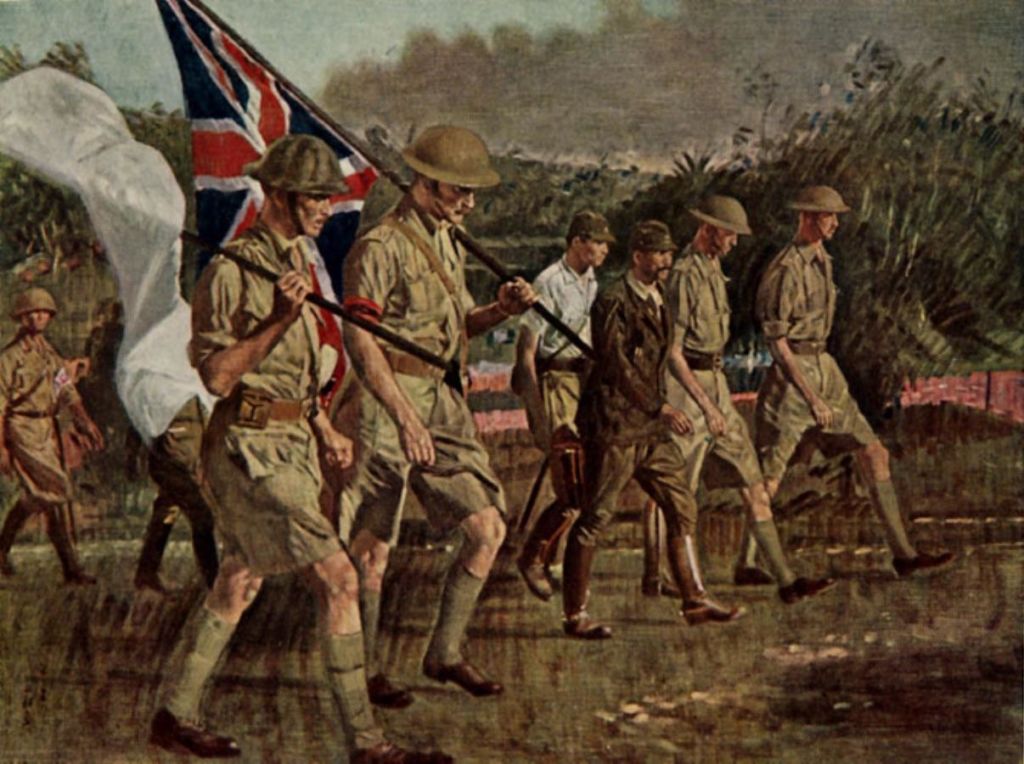 [16]
[16]The British surrender to the Japanese in Singapore was the result of the decline of British industry, which meant Singapore was inadequately fortified; a hostile Italian navy between Britain and the Suez Canal; and London’s decision to terminate the 1902 Anglo-Japanese Alliance in 1921.
The Pyrrhic Victory of 1945
British policy towards European affairs during the interwar period was one of neutrality, but bafflingly so. During the Spanish Civil War [17], the British were officially neutral, but the Labour Party argued for arming the Republican Government while endorsing continued disarmament in Britain. On the Continent, British aloofness to events in Spain was a green light to the other powers to pursue their own agendas.
The Munich Agreement that was signed on September 30, 1938 appeared for a moment to be “peace in our time,” but it instead caused British politicians to again focus on events in Europe. Shortly after, Czechoslovakia fell apart along its internal ethnic fault lines and German troops moved in to fill the vacuum. This created a sense of panicked urgency in the British government, and they issued the now infamous ultimatum to Germany regarding Poland.
Barnett doesn’t argue that the ultimatum was a mistake, but he does point out that the German government was surprised by the sudden, passionate interest of the British in Poland considering that they’d been so indifferent up to that point. As a result, a great and terrible war arrived. Eventually the whole globe would be affected. The Japanese captured Singapore, Malaya, the Dutch East Indies, and more, while the Germans conquered Europe. The British held out, protected by their Spitfire and Hurricane fighter planes, but while these aircraft were designed and assembled in England, they were equipped with foreign instruments and built with foreign-sourced machine tools. By 1940, most British weapons, apart from their anti-aircraft artillery, were out-of-date compared to those of the Germans.
As the war continued, the British became a warrior nation armed by the Americans. This came with a catch, though. The United States was not a genuine supporter of the British Empire. Barnett points to the German and Irish ethnic groups in the US as part of the issue, but there was also the America First movement, which was a social movement based primarily among Midwestern Anglo-Saxons. As soon as the war ended, the America Firsters made sure American funding for Britain vanished. The US managed to become a great power despite having contributed far less in terms of the percentage of its labor force that went under arms compared to its rivals.
The Collapse of American Power?
There are some considerable parallels between the British predicament to the current American one, most notably the loss of American manufacturing. Like Britain on the eve of the First World War, the US today has lost nearly every industry, including high-end products. China leads in rare earth metals, manufactures every sort of communications device, and has developed hypersonic missiles.
Then there is strategic overreach. The US has military commitments to nations that are nothing but a burden. The most obvious one is Israel, and a case can be made that the Iraq War and America’s involvements in Syria and Libya only benefited them. Then there is the defense of South Korea, where the US maintains thousands of troops to support a nation that has stolen a great deal of American industry by exploiting the US’ idiotic trade policies. And it is obvious from the ongoing crisis in Ukraine that NATO has expanded too far east.
In the same way that the British Empire was destabilized by educating the Indians, the United States is being destabilized by its sub-Saharan minority. This minority is educated to be a menace, and it has an outsized influence on domestic politics through the South Carolina primary, the mainstream media, and the Democratic Party. And this minority’s problems relative to its benefits are more burdensome to the US than India was to the British Empire.
The parallels between the British Empire and the United States aren’t precise, but without a doubt there are some similar trends. Reversing them will take wisdom and hard work. Under no circumstances should Americans allow their government to issue an ill-advised ultimatum to a powerful enemy.
* * *
Counter-Currents has extended special privileges to those who donate $120 or more per year.
- First, donor comments will appear immediately instead of waiting in a moderation queue. (People who abuse this privilege will lose it.)
- Second, donors will have immediate access to all Counter-Currents posts. Non-donors will find that one post a day, five posts a week will be behind a “paywall” and will be available to the general public after 30 days.
To get full access to all content behind the paywall, sign up here:
Paywall Gift Subscriptions
 [18]If you are already behind the paywall and want to share the benefits, Counter-Currents also offers paywall gift subscriptions. We need just five things from you:
[18]If you are already behind the paywall and want to share the benefits, Counter-Currents also offers paywall gift subscriptions. We need just five things from you:
- your payment
- the recipient’s name
- the recipient’s email address
- your name
- your email address
To register, just fill out this form and we will walk you through the payment and registration process. There are a number of different payment options.
